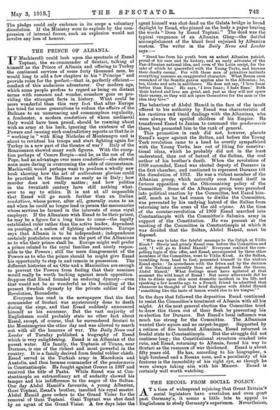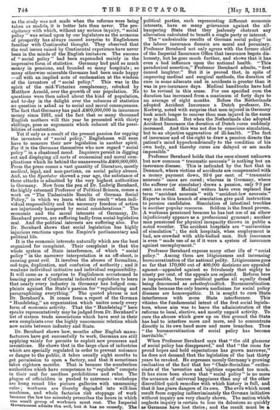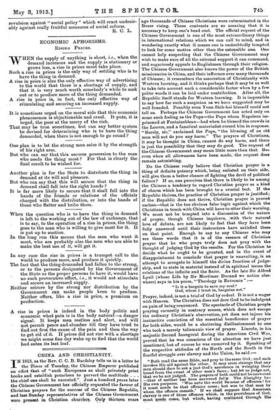THE RECOIL FROM SOCIAL POLICY.
AT a time of widespread rejoicing that Great Britain's social legislators have overtaken and even gone past Germany's, it seems a little late to appeal to Englishmen to study Germany's experience. Nevertheless, as the study was not made when the reforms were being taken as models, it is better late than never. The pre- cipitancy with which, without any serious inquiry, " social policy " was seized upon by our legislators as the arcanum of prosperity has always caused surprise to Englishmen familiar with Continental thought. They observed that the real issues raised by Continental experience have never been in the minds of the English imitators. The success of " social policy " had been expounded mainly in the impressive form of statistics. Germany had paid so much money in pensions, and founded so many hospitals ; so many otherwise miserable Germans had been made happy —all with an implied note of exclamation at the wisdom of the inventors of " social policy." This was in the spirit of the mid-Victorian complacency, rebuked by Matthew Arnold, over the growth of our population. No questions were then asked about the kind of population, and to-day in the delight over the columns of statistics no question is asked as to social and moral consequences. The fact that Get many has paid X400,000,000 in insurance money since 1881, and the fact that so many thousand English mothers will this year be presented with thirty shillings, pose as arguments which exhaust all the possi- bilities of contention.
Yet if only as a result of the present passion for copying the inventors of " social policy," Englishmen will soon have to measure their new legislation in another spirit. For it is the Germans themselves who now regard " social policy" in a chastened mood. Inquirers persist in digging out and displaying all sorts of economical and moral com- plications which lie behind the unanswerable X400,000,000. From the press comes a vast quantity of literature, mostly medical, legal, and non-partisan, on social policy abuses. And, as the Spectator showed a year ago, the substance of these attacks is admitted by the very highest authorities in Germany. Now from the pen of Dr. Ludwig Bernhard, the highly esteemed Professor of Political Science, comes a work on " The Undesirable Results of German Social Policy," in which we learn what ills result " when indi- vidual responsibility and the necessary freedom of action are injuriously hampered by social considerations." The economic and the moral interests of Germany, Dr. Bernhard proves, are suffering badly from social-legislative zeal. And the political interests are suffering also. For Dr. Bernhard shows that social legislation has highly injurious reactions upon the Empire's parliamentary and political life. It is the economic interests naturally which are the best organized for complaint. Their complaint is that the whole system of State interference, of which " social policy " in the narrower interpretation is an off-shoot, is causing great evil. It involves the abuses of formalism, red-tape, duplication, and confusion of authority ; and it weakens individual initiative and individual responsibility. It will come as a surprise to Englishmen accustomed to hearing praise of Continental industrial regulation to learn that nearly every industry in Germany has lodged com- plaints against the State's passion for "regularizing and paragraphizing everything." The quoted phrase is not Dr. Bernhard's. It comes from a report of the German " Handelstag," an organization which unites nearly every form of economic activity. That the " Handelstag ' here speaks representatively may be judged from Dr. Bernhard's list of sixteen trade associations which have sent in their own complaints over the highly uneconomic relation which now exists between industry and State.
Dr. Bernhard shows how, months after English manu- facturers have got successfully to work, Germans are still applying vainly for permits to exploit new processes and inventions. He shows that in the large class of industries which are specially regulated in order to prevent nuisance or danger to the public, it takes usually eight months to get permission to open a factory, and that it sometimes takes eighteen months. That is because the numberless authorities which have competence to " regulate " compete in their zeal for needless prohibitions and rules. The plague of officialdom is pushed to extremes : workshops are hung round like picture galleries with unmeaning rules ; workmen are thereby degraded into will-less machines, and whole factories risk stoppage of work because the law too minutely prescribes the hours in which one small group of workmen must rest. The Imperial Government admits the evil, but it has no remedy. The political parties, each representing different economic interests, have so many grievances against the all- hampering State that they jealously obstruct any alleviation calculated to benefit a single party or interest.
The " undesirable results of German social policy " in the labour insurance domain are moral and pecuniary. Professor Bernhard not only agrees with the former chief of the Imperial Insurance Office that insurance begets dis- honesty, but he goes much further, and shows that it has even a bad influence upon the national health. " This paradoxical assertion," Professor Bernhard admits, " first caused laughter." But it is proved that, in spite of improving medical and surgical methods, the duration of cure in some ailments and in accidents is greater than it was in pre-insurance days. Medical handbooks have had to be revised in this sense. For one specified cure the duration has increased from a maximum of forty days to an average of eight months. Before the Netherlands adopted Accident Insurance a Dutch professor, Dr. Kortwig, noted with surprise that men injured in Germany took much longer to recover than men injured in the same way in Holland. But when the Netherlands also adopted Accident Insurance the duration of Dutch cures suddenly increased. And this was not due to conscious simulation, but to an objective aggravation of ill-health. " The fact of insurance and of the right to draw a pension directs the patient's mind hypochondriacally to the condition of his own body, and thereby cures are delayed or are made impossible."
Professor Bernhard holds that the once almost unknown but now common " traumatic neurosis" is nothing but an insurance disease. This is indicated by the fact that in Denmark, where victims of accidents are compensated with a money payment down, 93-6 per cent. of " traumatic neurosis" cases are cured; whereas in Germany, where the sufferer (or simulator) draws a pension, only 9.3 per cent. are cured. Medical writers have even replaced the term " accident neurosis " with " accident-law neurosis." Experts in this branch of simulation give paid instruction to pension candidates. Simulation of intestinal troubles is another popular resource. Seldom is the fraud proven. A workman pensioned because he has lost use of an elbow injudiciously appears as a professional gymnast ; another man pensioned for physical incapacity throws in public a noted wrestler. The accident hospitals are " universities of simulation"; the sick hospitals, when employment is bad, are crowded. with able-bodied men. Sick insurance is even " made use of as if it were a system of insurance against unemployment."
Professor Bernhard exposes many other ills of " social policy." Among them are litigiousness and increasing bureaucratization of the national polity. Litigiousness goes so far that 170,000 out of 400,000 decisions are appealed against—appealed against so frivolously that eighty to ninety per cent. of the appeals are rejected. Reform here is impossible, because political parties all equally dread being denounced as arbeiterfeindlich. Bureaucratization results because the only known medicines for social policy diseases are homoeopathic. It is sought to cure State interference with more State interference. This vitiates the fundamental intent of the first social legisla- tors, whose aim was to leave the administration of the reforms to local, elective, and mostly unpaid activity. To cure the abuses which grew up on this ground the State has had to interfere more and more, and to concentrate directly in its own hand more and more branches. Thus " the bureaucratization of social policy has become inevitable."
When Professor Bernhard says that " the old glamour of social policy has disappeared, and that "the room for proud hopes and bold expectations has grown narrower," he does not demand that the legislation of the last thirty years be revoked. He expresses merely Germany's growing realization of the fact that her " Chair-Socialism " enthu- siasts of the 'seventies and 'eighties expected too much. It has since been shown that " social policy" is no more the arcanum of universal happiness than any of the other discredited quick remedies with which history is full, and that it has grave dangers of its own. The evils which must result from copying indiscriminately the German initiative without inquiry are very clearly shown. The nation which neglects inquiry is certain to lose its delusions as quickly as Germans have lost theirs ; and the result must be a
revulsion against "social policy" which will react undesir- ably against really fruitful measures of social reform. R. C. L.




















































 Previous page
Previous page